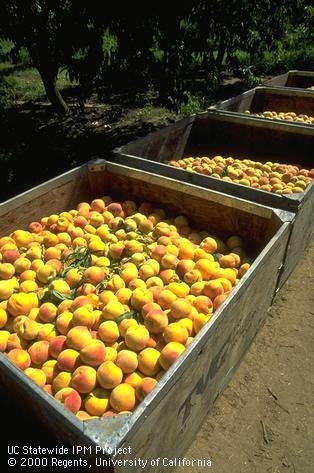Posts Tagged: cling peaches
Valley farmers are pulling out peaches

Many environmental factors can significantly compromise a peach harvest, said Maxwell Norton, UC Cooperative Extension advisor in Merced County.
"For tree fruit you need to have a greater net profit than you do raising tree nuts because growing tree fruit is so much more risky," he said. "The biggest risk of all is not being able to find enough labor during harvest. Peaches, when they're ripe, you have very few days to harvest."
In the Northern San Joaquin Valley, including Merced and Stanislaus counties, about 8.2 percent of bearing acres for clingstone peaches, or 667 acres, have been pulled out of production this fall, the article said.
Because trees are being pulled out, processors are beginning to increase the price they are offering.
Delhi farmer Glenn Arnold said he's clinging to peaches for now.
"I was happy when I heard the price because it's a fair price," he said. "A hail storm can take your whole crop in two minutes. If you don't get compensated adequately for the risk, you might switch to an alternative."
Budget cuts felt on agricultural campuses
An article by Ching Lee in today's Ag Alert focused on the effects of budget cuts on agricultural student programs at California universities. "Budget cuts have had a profound effect on all areas of the campus," Diane Ullman, associate dean for undergraduate academic programs at UC Davis College of Agricultural and Environmental Sciences, told the reporter. She explained the college faces challenges keeping agricultural production facilities, instructional equipment and technologies updated to deliver hands-on education — even though the office has seen student applications increase by 70–80 percent.
Tom Baldwin, dean of UC Riverside College of Natural and Agricultural Sciences, also commented on the challenges of serving students in the face of diminishing resources, saying the university is "moving heaven and earth" to do so.
The cuts are being felt at on-campus farms as well. Raoul Adamchak, of the UC Davis Student Farm, explained that the market garden generates its own income and provides a lesson to students on self-sustaining businesses. "Things cost money, and these are part of the expenses of farming, so it has to be factored in. They have to make decisions based on the cost of things and the returns," he said.
Peach association to major retailer: Buy U.S.-grown
Christine Souza, Ag Alert
The California Canning Peach Association has asked Target to consider California fruit for its Market Pantry-brand canned peaches, which are currently a product of China. Wal-Mart carries a comparable product made from California cling peaches, with a lower retail price.
Reporter Christine Souza sought expert commentary from Roberta Cook, UC Cooperative Extension marketing specialist at the Davis campus, on the current market for California cling peaches. "When you are talking about processed items, if another country can produce it a lot cheaper than you, then you will be vulnerable to competition. And consumer preferences have moved towards fresh. So [California cling-peach businesses] are hit by both factors," she told the reporter.
Related ANR News Blog post: Chinese farmers take a bite out of the California cling-peach market

Chinese farmers take a bite out of the California cling-peach market
California cling-peach growers' market dominance is beginning to erode in the face of cheap cling-peach imports from China, according to an article in today's Fresno Bee.
Imports of lower-priced Chinese canned cling-peaches grew from 43,000 cases 10 years ago to more than 2.2 million last year, the article said. Chinese peaches now represent 12 percent of the 16 million cases consumed in the U.S.
To defend their turf, California growers are looking for ways to reduce their production costs. Bee reporter Robert Rodriguez spoke to UC Cooperative Extension farm advisor Roger Duncan about his research with German-made equipment that would cut the cost of spring hand-thinning, a practice that ensures ripe fruit reaches the proper size.
"I am optimistic that growers will take a look at this," Duncan was quoted. "Because it is going to be difficult to compete against a country that can produce a product cheaper than we can.
Mechanical pre-thinning will not replace the hand thinning, but it can reduce the cost -- estimated at about $1,000 an acre -- by 25 to 30 percent.
"We've done lots of studies in California on mechanical and chemical fruit thinning or blossom thinning," Duncan said. "Generally what we see is the earlier you remove those fruit, the larger the remaining fruit are at harvest because there is less competition for nutrients from the mother tree."
In addition to finding efficiencies in their production practices, the cling-peach industry is asking Americans to buy the home-grown product.
"We need to educate consumers that they should be looking for peaches from the U.S.," Reedley farmer Harry Berberian told Rodriguez. "There are a lot of us who have been growing cling peaches for a long time. It's in our blood. And we are going to keep going as long as we can, but it is not going to be easy."
The online version of the Bee story generated many outraged comments from readers, including:
"We used to produce the best peaches in the world, how can we compete with these fellas from China? The folks from this country will work for a few cents a day, they don't complain about the job, and if they do, there's a heck of a lot of Chinese folks that will take their place."
"Who let that happen? We the people want our jobs back that the American government gave to China. It should be economic treason what Wall Street and the government have done!"

UC farm advisor Roger Duncan, center, with a group of California farmers.